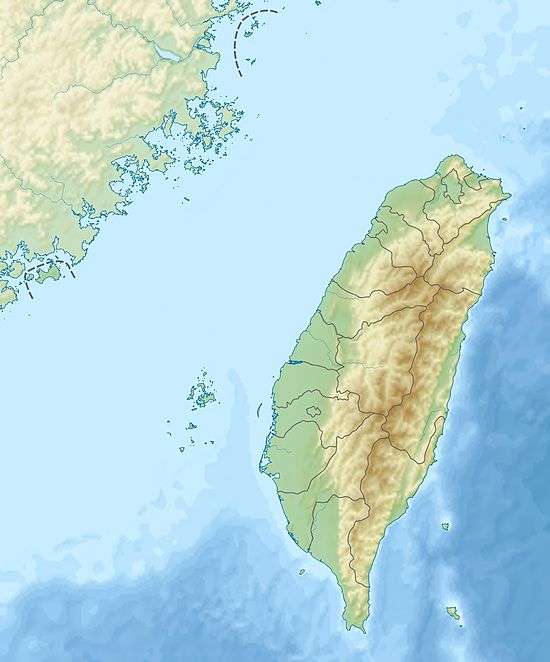Zhuokou River
| Zhuokou River | |
|---|---|
 The location of the confluence of the Zhuokou and Gaoping Rivers | |
| Country | Taiwan |
| Basin features | |
| Main source |
Central Mountain Range: Beinan Mountain 3,293 m (10,804 ft) |
| River mouth |
Liouguei 22°53′04″N 120°38′45″E / 22.8844°N 120.6457°ECoordinates: 22°53′04″N 120°38′45″E / 22.8844°N 120.6457°E |
| River system | Gaoping River |
| Basin size | 378 km2 (146 sq mi) |
| Physical characteristics | |
| Length | 50 km (31 mi) |
| Discharge |
|

Map of the Gaoping River watershed with Zhuokou on the right
The Zhuokou River, also spelled Chokou River or Jhuokou River (Chinese: 濁口溪; pinyin: Zhuókǒu Xī; Wade–Giles: Cho2-kou3 Hsi1),[2] is a tributary of the Laonong River, which in turn is a tributary of the Gaoping River, the main stream of this major river system in southwestern Taiwan.[3][4] It flows through the Taoyuan and Maolin Districts of Kaohsiung City for 50 km.[5]
See also
References
- ↑ "98年高屏溪流域管理工作執行年報" (PDF) (in Chinese). Gaoping River Basin Management Committee. October 2010. Retrieved 12 June 2016.
- ↑ "GeoNames Search". Geographic Names Database. National Geospatial-Intelligence Agency, USA. Retrieved 12 June 2016.
- ↑ "Gaoping River" (in Chinese). Water Resources Agency, Ministry of Economic Affairs. Retrieved 12 June 2016.
- ↑ Liu, James T.; Hsu, Ray T.; Hung, Jia-Jang; Chang, Yuan-Pin; Wang, Yu-Huai; Rendle-Bühring, Rebecca H.; Lee, Chon-Lin; Huh, Chih-An; Yang, Rick J. (2016). "From the highest to the deepest: The Gaoping River–Gaoping Submarine Canyon dispersal system". Earth-Science Reviews. 153: 274–300. doi:10.1016/j.earscirev.2015.10.012.
- ↑ Hsu, Chia-Ming; Chen, Hongey (2012). "濁口溪流域的地表作用與曲流地形間之相對應關係" [The relationships between earth surface processes and meandering forms along the catchment of the Jhuokou River] (PDF). Journal of Chinese Soil and Water Conservation (in Chinese). 43 (3): 227–238.
This article is issued from
Wikipedia.
The text is licensed under Creative Commons - Attribution - Sharealike.
Additional terms may apply for the media files.